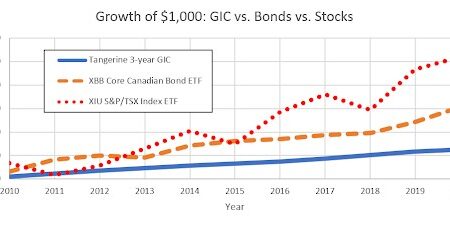Best Recession Stocks in Canada for 2026
With Canadian dividend stocks facing significant pressure this year, many readers are asking me what are the safest stocks in Canada right now. Given the volatility affecting traditional favorites like bank stocks and telecoms, are they really the right play for investors that are focused on not losing capital?
As recession and bear market concerns persist, I remain a strong believer in long-term investing. While I do plan to keep most of my Canadian dividend stocks and ETF investments as they are, below are my picks for the best defensive stocks in Canada.
What Is a “Defensive Stock”?
You might have heard of defensive stocks also being referred to as “recession-proof stocks” or “sleep easy stocks”.
While the term “defensive stock” doesn’t have an agreed upon definition, the phrase is often used to refer to companies that have been around a long time, and have a long-term durable competitive advantage. They have a lot in common with Canadian moat stocks.
Other common characteristics of defensive stocks would include:
- A cash flow model that can survive recessions and market pullbacks.
- A long-term history of several decades without a dividend cut.
- Earnings that don’t depend on market cycles.
- Low volatility in the stock price.
- Usually steady, slow growth rates.
Traditionally Canada’s best blue chip stocks, as well as Canadian dividend kings would have a lot of crossover with Canadian defensive stocks, but given the performance of some of these share prices over the past year, some are questioning which companies still belong on this list.
Five Best Canadian Defensive Stocks
Company | Price | Market Cap | P/E | Dividend Yield | Dividend Streak |
Canadian National Railway | 155.73 | 98.49B | 18.43 | 2.17% | 27 |
National Bank | 112.88 | 38.42B | 11.71 | 3.90% | 13 |
Loblaws | 167.36 | 51.20B | 25.29 | 1.23% | 11 |
Alimentation Couche-Tard | 81.76 | 78.22B | 20.94 | 0.86% | 13 |
Fortis | 59.01 | 29.22B | 18.50 | 4.00% | 50 |
?????? (Hidden, click for access) | ?????? (Hidden, click for access) | ?? | ??.?? | ?.??% | ?? |
Canadian National Railway
Let’s keep this simple: No one is building another railway in Canada and businesses will always have to ship goods across our massive nation.
Because those two things are true, we know for a fact that CNR will always make money. Some years (usually when grain and oil peak) they will make more, and other years they will make a bit less, but this is about as safe a business model as you’re going to find.
Of course, along with that easy-to-identify safety comes a relatively high share price. I would be surprised if you ever saw CNR shares skyrocket from this point, as the price is already valuing the company fairly highly.
On the other hand, the company has not only defended its dividend over the years, but has actually raised it every single year since 1996. When you consider all of the world events that have occurred in those 27 years, that’s a pretty impressive record.
If you want to compare CNR to its oligopoly cousin – Canadian Pacific Rail – I recommend checking our article on Canadian railway stocks.
National Bank
As you know if you read our best Canadian bank stocks in Canada article, National Bank is our favourite stock amongst a group that we are big fans of. It’s tough to go wrong with big banks TD and RBC, but we’ve loved National Bank for some time now due to its room for growth and Quebec-centric footprint.
That faith was rewarded in 2023, as it has been Canada’s best performing bank stock this year.
The big 6 Canadian banks had a rough year in 2023 due to concerns about rising insolvencies caused by rising interest rates. So far, those fears have yet to be realized, but if rates stay “higher for longer” there is no doubt that it will have some impact on the bottom line – the question is: how much?
Over half of National Bank’s lending is in Quebec – where housing prices are much lower than Toronto and Vancouver. Consequently, I’d argue the bank has much lower lending risk then its Big 6 siblings. National Bank has rewarded me handsomely over the past few years as it has been the best bank to own for a while now.
Loblaws
When people’s bank accounts are taking a hit, they’re going to reduce expenses as much as possible.
Two places they need to go no matter what?
The drug store and the grocery store.
That’s why Loblaws (which also owns Real Canadian Superstore and Shoppers Drug Mart) is a great defensive stock.
In fact, it made such good profits during the recent market pullback (it simply raised prices and passed inflated costs right along to the consumer) that the government took notice. While the government’s focus on the big grocers will be a slight negative drag, it’s usually a good sign when your company makes so much money in a downturn that people take notice.
Alimentation Couche-Tard
Alimentation Couche-Tard has been Mike Heroux’s favourite stock for a while now. You can ask him if it’s still on his “buy list” if you sign up to his free monthly webinar.
You can check out Dale Roberts’ take on Couche-Tard and Loblaws by reading about Canada’s best retail stocks.
In addition to buying groceries and cough medicine, what else do consumers always need?
To put gas in their tank of course.
And while they’re waiting for the fill up, they just might be tempted to buy a snack or a coffee…
Again – that’s a pretty stable business model! Couche-Tard has executed their growth-by-acquisition model to perfection over the years, and they don’t look to be stopping any time soon.
If you’re worried that the growth of electric vehicles is going to hurt this defensive stock all star in the long run, the management team is way ahead of you. They are already testing out hybrid gas/electric “refill” stations over in Norway (the king of electric cars). It turns out that the longer wait times for a battery recharge lead to more time to buy higher profit margin items inside!
Overall, this company has been one of Canada’s best blends of stability plus growth over the last couple of decades.
Fortis
If safety is what you’re after in choosing a Canadian defensive stock, then there is one name that you should place above all others: Fortis.
This Canadian dividend king has been one of Canada’s best utility stocks for longer than I’ve been alive.
Fortis currently holds the record for dividend increase streak, and is closing in on its 51st consecutive year of dividend increases! That’s a heck of a run – but the company doesn’t appear to be slowing down at all. In fact, it just has one if its strongest earnings-per-share increases in a while.
Now, before anyone gets too excited, I should point out that as a utility, Fortis has a ceiling on just how much it can grow and/or how high its profit margins can get. Governments largely determine what Fortis is allowed to charge, and consequently, it’s not possible to really boost fees through the roof. That said, it’s tough to cut down on electricity use – even in a recession – so Fortis remains an excellent low risk investment.
Are Telus, BCE, and Rogers Defensive Stocks?
Canadian telecommunications stocks have been my biggest disappointment this year. I chalk this up to two main issues:
1) The market is getting nervous about the amount of debt these companies are piling on in order to build their 5G infrastructure (and other capital expenditures). Given all of the “higher for longer” talk about interest rates, there is worry that as more low-interest debt rolls over that the interest will chew away more and more of the bottom line for these companies.
2) When you look at Canadian GIC rates and see that you can get a guaranteed rate of 5%+, it can be hard to get risk-averse investors interested in dividend-heavy stocks like Telus and Bell.
Personally, I’m still a fan of these companies, and believe they have considerable room to raise prices when push comes to shove, given their oligopoly status. That said, their free cash flow numbers need to be watched very carefully going forward. Here’s a video explaining why.
Until we know for sure where interest rates are headed, I hesitate to label Canadian telecoms as “defensive stocks” in the purest sense of the word.
Are Natural Resource Stocks Not Recession-Proof Stocks?
Some people like to say that oil company stocks like Canadian Natural Resources or Suncor are naturally defensive stocks. Others claim that precious metal companies like Barrick Gold are defensive stocks.
I’m not a fan of either statement.
If a company’s revenues are very highly correlated with the price of a single resource, then it shouldn’t be called defensive. Just because oil and gold stocks have fared well during the latest bear market, doesn’t mean that they are defensive stocks as a rule. In fact, natural resource stocks are some of the most volatile around – which makes sense given that they rely so heavily on highly-fluctuating commodity prices.
Now Canadian pipeline stocks exist in a bit more of a grey area to me. At first glance you might think that pipeline revenues are directly tied to the prices of fossil fuels, but this isn’t true at all in the short-term. Pipeline contracts are usually made many years in advance, and pay the same no matter what the spot price is for oil or natural gas that day. Consequently, one could argue that their business model is fairly defensive.
The problem is that long-term, I’m less sure that people will 100% need natural gas vs say the electricity that Fortis delivers, or the groceries that Loblaws sells. There is also the issue of free cash flow being gobbled up by increased debt loads. In this way, companies like Enbridge are similar to the capital expenditure-intense telecoms I discussed above.
How to Buy Defensive Stocks in Canada
Buying defensive stocks is no different than buying any other type of stock or ETF in Canada.
There is currently an incredible deal going on right now with our #1 online broker in Canada – Qtrade. You get $100 as a deposit bonus + up to $2,000 more in cashback depending on the amount you deposit when you first fund your account.
You can read our Qtrade review for more details, or see our list of the best online brokers in Canada to see all options and why we rate Qtrade as the best.
What Are Other Good Investments During a Recession?
If you are worried about an incoming recession or bear market, it’s a good idea to diversify your investment portfolio with a focus stability and security. While i always advocate doing so, it becomes even more pertinent in times of volatility and uncertainty, when you really want to spread risk across different assets.
Beyond defensive or dividend stocks, several other investments can help mitigate risk and preserve capital. The key parameters for choosing these investments include safety, predictability, and liquidity. Here are some top picks:
1. Government Bonds: Government bonds, especially those issued by the Canadian government, are considered one of the safest investments. They provide a fixed interest rate and are backed by the government. Provincial and municipal bonds also offer safety and often provide higher yields than federal bonds.
2. Guaranteed Investment Certificates (GICs): GICs are low-risk investments that guarantee the return of your principal along with a fixed interest rate. They are insured by CDIC up to certain limits, adding an extra layer of security.
With interest rates still being relatively high right now, this is a really solid option in my opinion. For more information check out the best GIC rates in Canada or my list of best Canadian banks.
3. Real Estate Investment Trusts (REITs): Canadian REITs focused on essential services and properties with stable income streams can be attractive.
4. Cash and Cash Equivalents: Maintaining a portion of your portfolio in cash or cash equivalents ensures liquidity and stability. These investments offer easy access to your funds and are less affected by market fluctuations, providing a safety net during uncertain times. Here are some options to consider:
Cash and Money Market ETFs: These funds invest in very short-term, high-quality fixed-income securities. They are traded like stocks on an exchange, providing liquidity and slightly higher returns compared to traditional money market funds.
High-Interest Savings Accounts (HISAs): These accounts offer a safe place to hold cash while earning higher interest than regular savings accounts. They provide easy access to your funds and are typically insured by government agencies (such as CDIC in Canada), adding an extra layer of security. Currently, EQ Bank is offering 4% interest rates, or 5% if you prefer the new EQ Notice Account.
Canadian Defensive Stocks – FAQ
Are Defensive Stocks The Best Low Risk Investment in Canada?
While our list of the best Canadian defensive stock is a great place to start your quest for safe investments, I also recommend checking out our article on the best low risk investments in Canada.
The other investment product that might catch your attention is what is officially known as a high interest savings account ETF or a money market ETF. We compare these types of high-interest funds in our best Cash ETFs in Canada article.
While the above defensive stocks are relatively stable and have low volatility, they are still part of an asset class that can see substantial swings in value from time to time.










